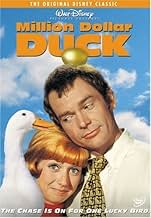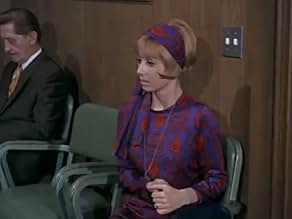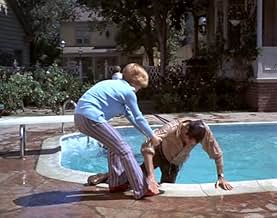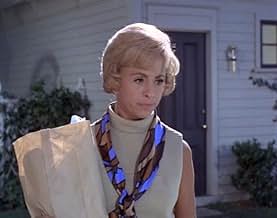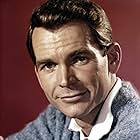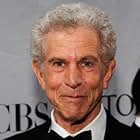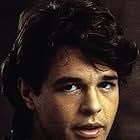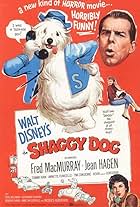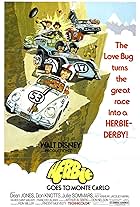IMDb RATING
5.8/10
2.8K
YOUR RATING
Professor Dooley takes home a duck from his research laboratory as a pet for his son, but soon finds out that it lays golden eggs.Professor Dooley takes home a duck from his research laboratory as a pet for his son, but soon finds out that it lays golden eggs.Professor Dooley takes home a duck from his research laboratory as a pet for his son, but soon finds out that it lays golden eggs.
- Awards
- 2 nominations
Lee Montgomery
- Jimmy Dooley
- (as Lee Harcourt Montgomery)
Peter Renaday
- Mr. Beckert
- (as Pete Renoudet)
- Director
- Writers
- All cast & crew
- Production, box office & more at IMDbPro
Storyline
Did you know
- TriviaNear the conclusion of the movie, just before Jimmy captures Charlie the duck, there is a Volkswagen Beetle with the license plate OFP 857 and inside the vehicle is a Great Dane. The tag was the very same as Herbie's in The Love Bug (1969), another Disney movie starring Dean Jones that was the first in a series of "Love Bug" films. The dog is the same breed as in The Ugly Dachshund (1966), also starring Dean Jones.
- GoofsThe logo and attachment that is on the Centennial is not the Hyundai logo. The logo and attachment on that car both appear to resemble the Lincoln logo.
- Quotes
Jimmy Dooley: I didn't want a duck! I wanted a puppy!
- Crazy creditsDuring the opening credits, an animated duck lays six eggs. Then, it places a "1" and a "$ " before these eggs. After it adds commas, the eggs turn golden with a cash register sound. The third egg then expands and blends into the opening scene.
- ConnectionsFeatured in Gus (1976)
Featured review
"The Million Dollar Duck" is a silly but fun fantasy comedy. In spite of some critics' disdain for such movies - if they are for kids (they don't seem to mind the silly adult films). This one was pleasing enough for kids and adults. Disney wasn't the only studio that saw a market for such comical films mostly during the 1960s through 1980s.
The adult humor is here as well, but it may not register with many in 21st century audiences. Indeed, this film shows something of American culture that has changed. Through the middle of the last century - after WW II and well into the 1970s, one of the staples of humor was the Internal Revenue Service and government taxes. People of all stripes, but mostly common, everyday folks and hometown businessmen complained about government taxes. One couldn't go into a bar, barbershop, cafe or drug store and not hear someone lamenting the government tax burden. Government employees indeed were not very favorably regarded, whether with the IRS or not.
One suspects that the culture change by the late 20th century is what brought an end to such commonplace disdain. The transformation to mostly two-income households had lifted many more people above the subsistence level. So, most families spend more and can afford more things. Ergo, less complaint about Uncle Sam taking too much.
Still, a college research professor in 1971 should have made a sufficient salary to support a family of three fairly comfortably. But, not so in this film. The name of his office on the door to Albert Dooley's (Dean Jones) lab reads, "Psycho Bio Research Laboratory." All of the cast are good in their roles. Sandy Duncan is funny early on as the slightly dingy Katie Dooley. Watching her make applesauce in the kitchen is a hoot. And Dean Jones's reaction is hilarious.
James Gregory is very funny as the stuffy Treasury head. And, Edward Andrews plays the worried, angst-filled representative of the Federal Reserve Bank, Morgan, superbly. Tony Roberts is especially good as the crafty lawyer neighbor and friend who can't take his own advice. If one watches closely, there's no little amount of spoofing in this film. Not just about government agents, but lawyers and others as well.
One of the humorous criticisms I can recall from around that time had to do with government grants. One instance went something like this - while some people were out of work, others were homeless, and small businesses were struggling to keep going, the government awarded a $140,000 grant to study the mating habits of frogs. I wonder if Albert Dooley's place of employment wasn't intended as a little jab at government along those lines.
This film isn't packed with laughter scenes, or with witty lines or silly situations. It has a little bit of each, and should bring a smile to most kids and adults even well into the 21st century.
In some places, the movie is slow. And a vehicle chase scene with Jones hanging on to a utility truck ladder is quite old. It had been done in so many films before that it just doesn't seem funny this time. Here are some favorite lines.
Katie Dooley, "Jimmy, don't bother your father with that now. He's got little enough on his mind as it is."
Jimmy Dooley, "Mr. Hooper next door... he has a dog. He can afford to feed it. It's a great big one." Albert Dooley, "Mr. Hooper next door works for the U.S. Treasury and they have all our money. He could afford a giraffe."
Finley Hooper, "I wish that fool professor made enough money so I could investigate him."
Dr. Gottlieb, "Excuse me. I have to go recheck the IQ of this chimp - a hundred and forty, higher than mine."
Fred Hines, "Look Al, sweetheart. I'm only trying to save you money. I mean by making me a partner, you'll save paying me all those exorbitant lawyer's fees."
The adult humor is here as well, but it may not register with many in 21st century audiences. Indeed, this film shows something of American culture that has changed. Through the middle of the last century - after WW II and well into the 1970s, one of the staples of humor was the Internal Revenue Service and government taxes. People of all stripes, but mostly common, everyday folks and hometown businessmen complained about government taxes. One couldn't go into a bar, barbershop, cafe or drug store and not hear someone lamenting the government tax burden. Government employees indeed were not very favorably regarded, whether with the IRS or not.
One suspects that the culture change by the late 20th century is what brought an end to such commonplace disdain. The transformation to mostly two-income households had lifted many more people above the subsistence level. So, most families spend more and can afford more things. Ergo, less complaint about Uncle Sam taking too much.
Still, a college research professor in 1971 should have made a sufficient salary to support a family of three fairly comfortably. But, not so in this film. The name of his office on the door to Albert Dooley's (Dean Jones) lab reads, "Psycho Bio Research Laboratory." All of the cast are good in their roles. Sandy Duncan is funny early on as the slightly dingy Katie Dooley. Watching her make applesauce in the kitchen is a hoot. And Dean Jones's reaction is hilarious.
James Gregory is very funny as the stuffy Treasury head. And, Edward Andrews plays the worried, angst-filled representative of the Federal Reserve Bank, Morgan, superbly. Tony Roberts is especially good as the crafty lawyer neighbor and friend who can't take his own advice. If one watches closely, there's no little amount of spoofing in this film. Not just about government agents, but lawyers and others as well.
One of the humorous criticisms I can recall from around that time had to do with government grants. One instance went something like this - while some people were out of work, others were homeless, and small businesses were struggling to keep going, the government awarded a $140,000 grant to study the mating habits of frogs. I wonder if Albert Dooley's place of employment wasn't intended as a little jab at government along those lines.
This film isn't packed with laughter scenes, or with witty lines or silly situations. It has a little bit of each, and should bring a smile to most kids and adults even well into the 21st century.
In some places, the movie is slow. And a vehicle chase scene with Jones hanging on to a utility truck ladder is quite old. It had been done in so many films before that it just doesn't seem funny this time. Here are some favorite lines.
Katie Dooley, "Jimmy, don't bother your father with that now. He's got little enough on his mind as it is."
Jimmy Dooley, "Mr. Hooper next door... he has a dog. He can afford to feed it. It's a great big one." Albert Dooley, "Mr. Hooper next door works for the U.S. Treasury and they have all our money. He could afford a giraffe."
Finley Hooper, "I wish that fool professor made enough money so I could investigate him."
Dr. Gottlieb, "Excuse me. I have to go recheck the IQ of this chimp - a hundred and forty, higher than mine."
Fred Hines, "Look Al, sweetheart. I'm only trying to save you money. I mean by making me a partner, you'll save paying me all those exorbitant lawyer's fees."
- How long is The Million Dollar Duck?Powered by Alexa
Details
- Release date
- Country of origin
- Official site
- Language
- Also known as
- $1,000,000 Duck
- Filming locations
- Toluca Lake, California, USA(pass the Post Office while riding on top of garbage truck)
- Production company
- See more company credits at IMDbPro
Box office
- Gross US & Canada
- $11,118,000
- Runtime1 hour 29 minutes
- Aspect ratio
- 1.33 : 1
Contribute to this page
Suggest an edit or add missing content

Top Gap
By what name was The Million Dollar Duck (1971) officially released in India in English?
Answer


